University Paper: Health Transitions of Older Adults
VerifiedAdded on 2022/08/17
|10
|3049
|449
Report
AI Summary
This report delves into the multifaceted health transitions experienced by older adults, examining the intricate interplay of psychosocial, existential, and familial factors. It begins by defining the core issues, including impaired mobility, organ function decline, and the increased risk of various diseases. The report then considers the psychosocial aspects, existential loneliness, and family responses through a hypothetical case study, illustrating how these elements impact mental health. It emphasizes the significance of understanding these transitions, referencing theories of aging and the impact of physical well-being on mental health. The role of geriatric nursing professionals in assessing and addressing these challenges is discussed, along with proposed changes to improve healthcare for older adults. The report concludes by highlighting the need for regular mental health assessments and the importance of family involvement in supporting older adults through these critical life transitions.
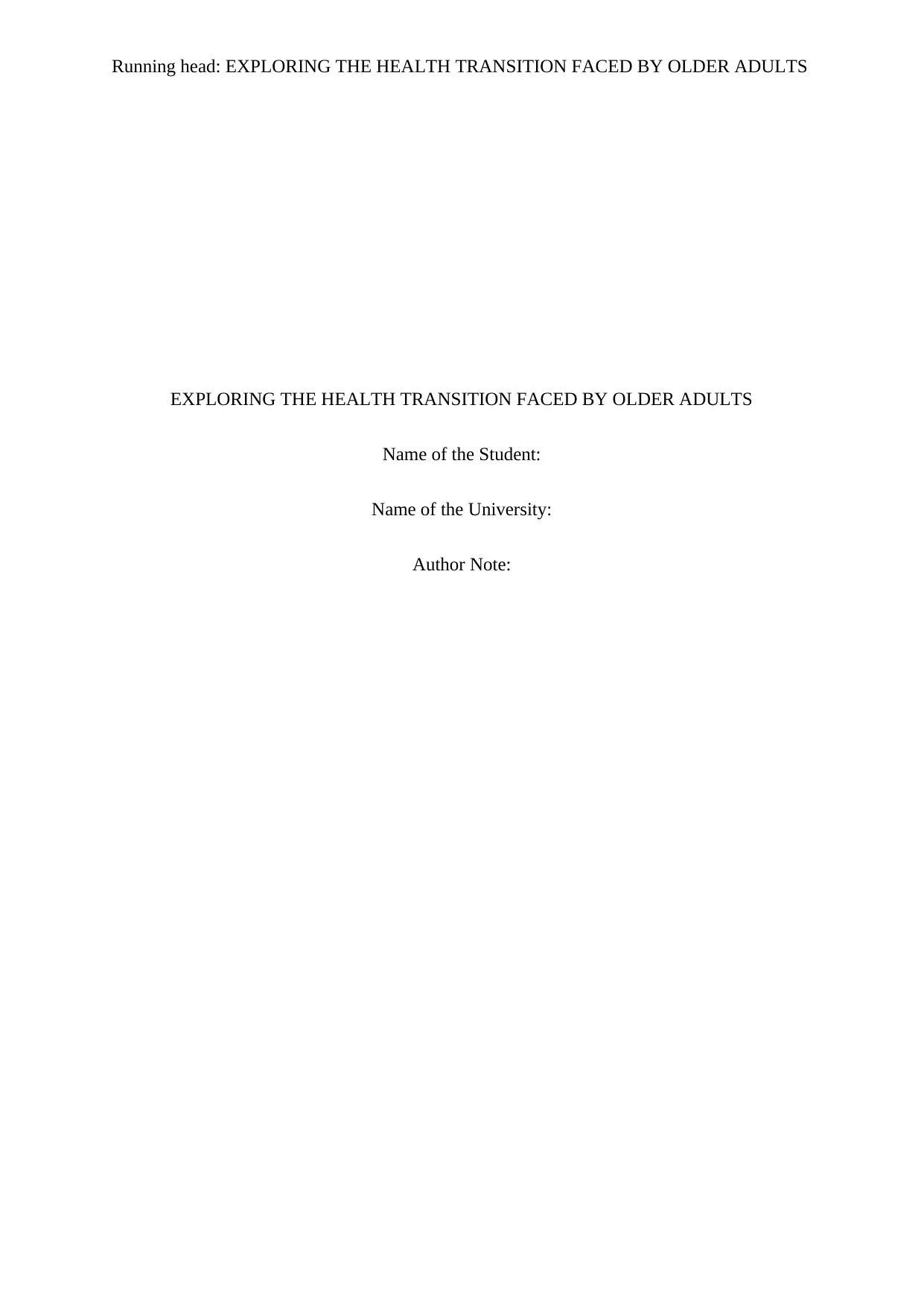
Running head: EXPLORING THE HEALTH TRANSITION FACED BY OLDER ADULTS
EXPLORING THE HEALTH TRANSITION FACED BY OLDER ADULTS
Name of the Student:
Name of the University:
Author Note:
EXPLORING THE HEALTH TRANSITION FACED BY OLDER ADULTS
Name of the Student:
Name of the University:
Author Note:
Paraphrase This Document
Need a fresh take? Get an instant paraphrase of this document with our AI Paraphraser
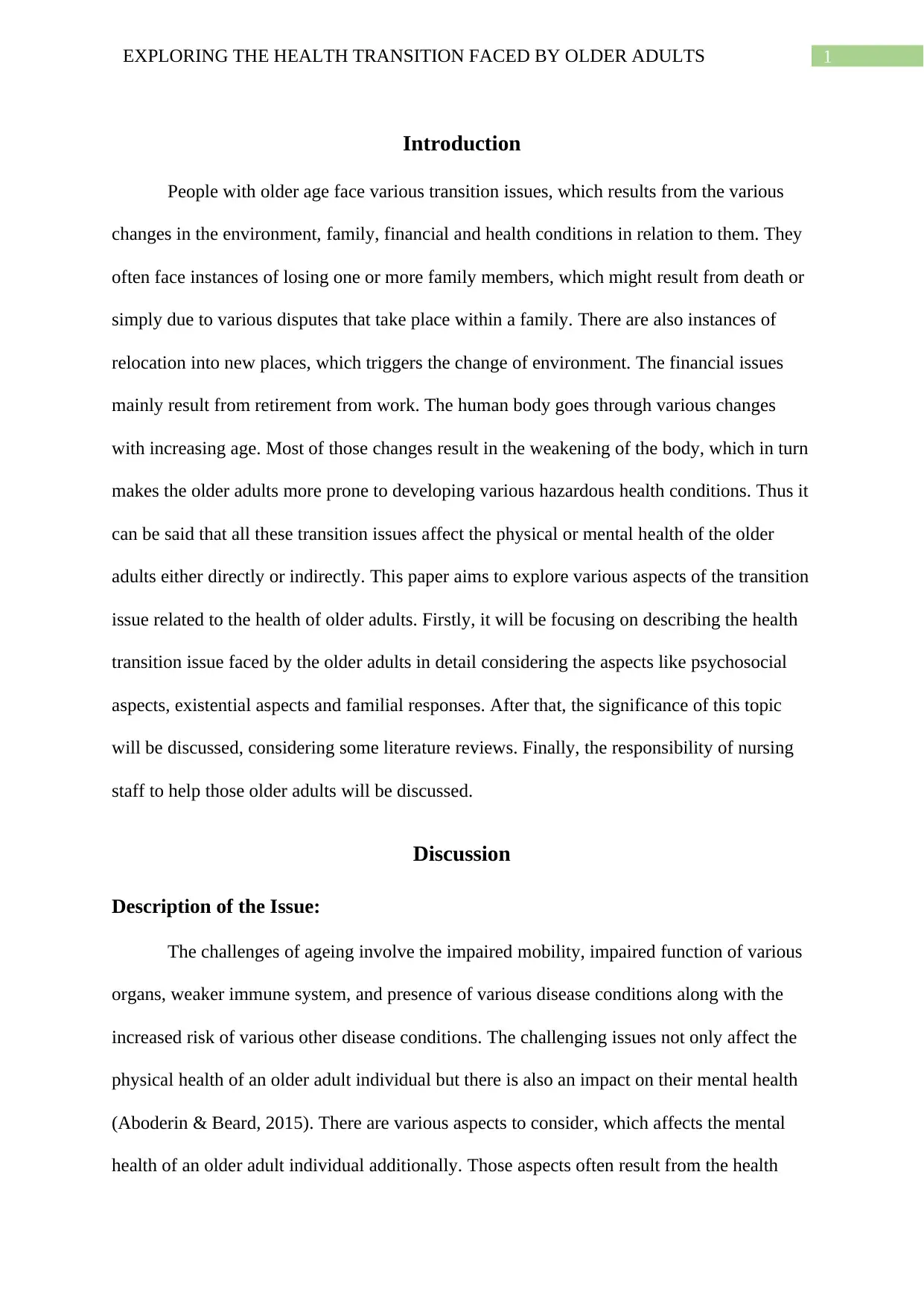
1EXPLORING THE HEALTH TRANSITION FACED BY OLDER ADULTS
Introduction
People with older age face various transition issues, which results from the various
changes in the environment, family, financial and health conditions in relation to them. They
often face instances of losing one or more family members, which might result from death or
simply due to various disputes that take place within a family. There are also instances of
relocation into new places, which triggers the change of environment. The financial issues
mainly result from retirement from work. The human body goes through various changes
with increasing age. Most of those changes result in the weakening of the body, which in turn
makes the older adults more prone to developing various hazardous health conditions. Thus it
can be said that all these transition issues affect the physical or mental health of the older
adults either directly or indirectly. This paper aims to explore various aspects of the transition
issue related to the health of older adults. Firstly, it will be focusing on describing the health
transition issue faced by the older adults in detail considering the aspects like psychosocial
aspects, existential aspects and familial responses. After that, the significance of this topic
will be discussed, considering some literature reviews. Finally, the responsibility of nursing
staff to help those older adults will be discussed.
Discussion
Description of the Issue:
The challenges of ageing involve the impaired mobility, impaired function of various
organs, weaker immune system, and presence of various disease conditions along with the
increased risk of various other disease conditions. The challenging issues not only affect the
physical health of an older adult individual but there is also an impact on their mental health
(Aboderin & Beard, 2015). There are various aspects to consider, which affects the mental
health of an older adult individual additionally. Those aspects often result from the health
Introduction
People with older age face various transition issues, which results from the various
changes in the environment, family, financial and health conditions in relation to them. They
often face instances of losing one or more family members, which might result from death or
simply due to various disputes that take place within a family. There are also instances of
relocation into new places, which triggers the change of environment. The financial issues
mainly result from retirement from work. The human body goes through various changes
with increasing age. Most of those changes result in the weakening of the body, which in turn
makes the older adults more prone to developing various hazardous health conditions. Thus it
can be said that all these transition issues affect the physical or mental health of the older
adults either directly or indirectly. This paper aims to explore various aspects of the transition
issue related to the health of older adults. Firstly, it will be focusing on describing the health
transition issue faced by the older adults in detail considering the aspects like psychosocial
aspects, existential aspects and familial responses. After that, the significance of this topic
will be discussed, considering some literature reviews. Finally, the responsibility of nursing
staff to help those older adults will be discussed.
Discussion
Description of the Issue:
The challenges of ageing involve the impaired mobility, impaired function of various
organs, weaker immune system, and presence of various disease conditions along with the
increased risk of various other disease conditions. The challenging issues not only affect the
physical health of an older adult individual but there is also an impact on their mental health
(Aboderin & Beard, 2015). There are various aspects to consider, which affects the mental
health of an older adult individual additionally. Those aspects often result from the health
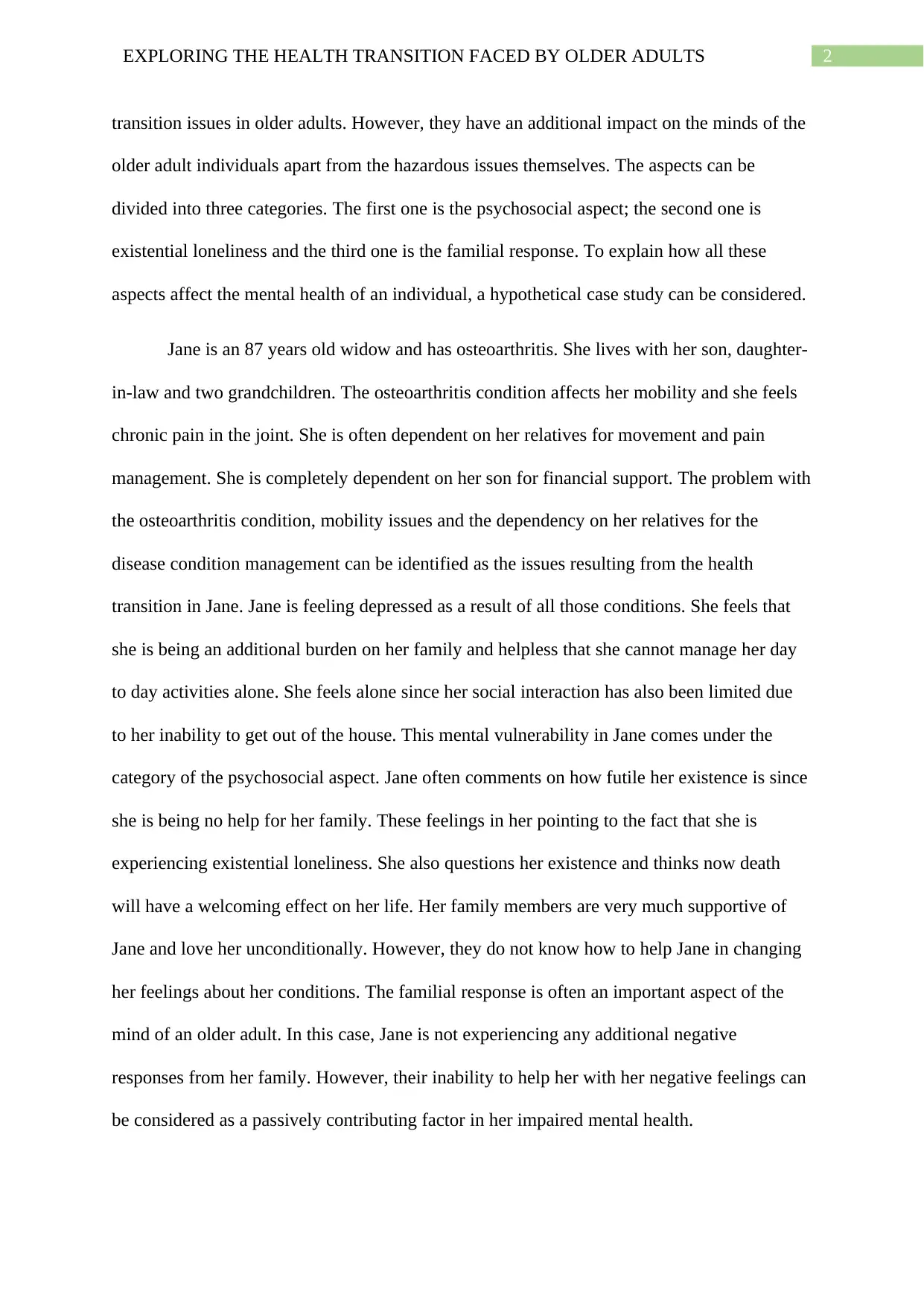
2EXPLORING THE HEALTH TRANSITION FACED BY OLDER ADULTS
transition issues in older adults. However, they have an additional impact on the minds of the
older adult individuals apart from the hazardous issues themselves. The aspects can be
divided into three categories. The first one is the psychosocial aspect; the second one is
existential loneliness and the third one is the familial response. To explain how all these
aspects affect the mental health of an individual, a hypothetical case study can be considered.
Jane is an 87 years old widow and has osteoarthritis. She lives with her son, daughter-
in-law and two grandchildren. The osteoarthritis condition affects her mobility and she feels
chronic pain in the joint. She is often dependent on her relatives for movement and pain
management. She is completely dependent on her son for financial support. The problem with
the osteoarthritis condition, mobility issues and the dependency on her relatives for the
disease condition management can be identified as the issues resulting from the health
transition in Jane. Jane is feeling depressed as a result of all those conditions. She feels that
she is being an additional burden on her family and helpless that she cannot manage her day
to day activities alone. She feels alone since her social interaction has also been limited due
to her inability to get out of the house. This mental vulnerability in Jane comes under the
category of the psychosocial aspect. Jane often comments on how futile her existence is since
she is being no help for her family. These feelings in her pointing to the fact that she is
experiencing existential loneliness. She also questions her existence and thinks now death
will have a welcoming effect on her life. Her family members are very much supportive of
Jane and love her unconditionally. However, they do not know how to help Jane in changing
her feelings about her conditions. The familial response is often an important aspect of the
mind of an older adult. In this case, Jane is not experiencing any additional negative
responses from her family. However, their inability to help her with her negative feelings can
be considered as a passively contributing factor in her impaired mental health.
transition issues in older adults. However, they have an additional impact on the minds of the
older adult individuals apart from the hazardous issues themselves. The aspects can be
divided into three categories. The first one is the psychosocial aspect; the second one is
existential loneliness and the third one is the familial response. To explain how all these
aspects affect the mental health of an individual, a hypothetical case study can be considered.
Jane is an 87 years old widow and has osteoarthritis. She lives with her son, daughter-
in-law and two grandchildren. The osteoarthritis condition affects her mobility and she feels
chronic pain in the joint. She is often dependent on her relatives for movement and pain
management. She is completely dependent on her son for financial support. The problem with
the osteoarthritis condition, mobility issues and the dependency on her relatives for the
disease condition management can be identified as the issues resulting from the health
transition in Jane. Jane is feeling depressed as a result of all those conditions. She feels that
she is being an additional burden on her family and helpless that she cannot manage her day
to day activities alone. She feels alone since her social interaction has also been limited due
to her inability to get out of the house. This mental vulnerability in Jane comes under the
category of the psychosocial aspect. Jane often comments on how futile her existence is since
she is being no help for her family. These feelings in her pointing to the fact that she is
experiencing existential loneliness. She also questions her existence and thinks now death
will have a welcoming effect on her life. Her family members are very much supportive of
Jane and love her unconditionally. However, they do not know how to help Jane in changing
her feelings about her conditions. The familial response is often an important aspect of the
mind of an older adult. In this case, Jane is not experiencing any additional negative
responses from her family. However, their inability to help her with her negative feelings can
be considered as a passively contributing factor in her impaired mental health.
⊘ This is a preview!⊘
Do you want full access?
Subscribe today to unlock all pages.

Trusted by 1+ million students worldwide
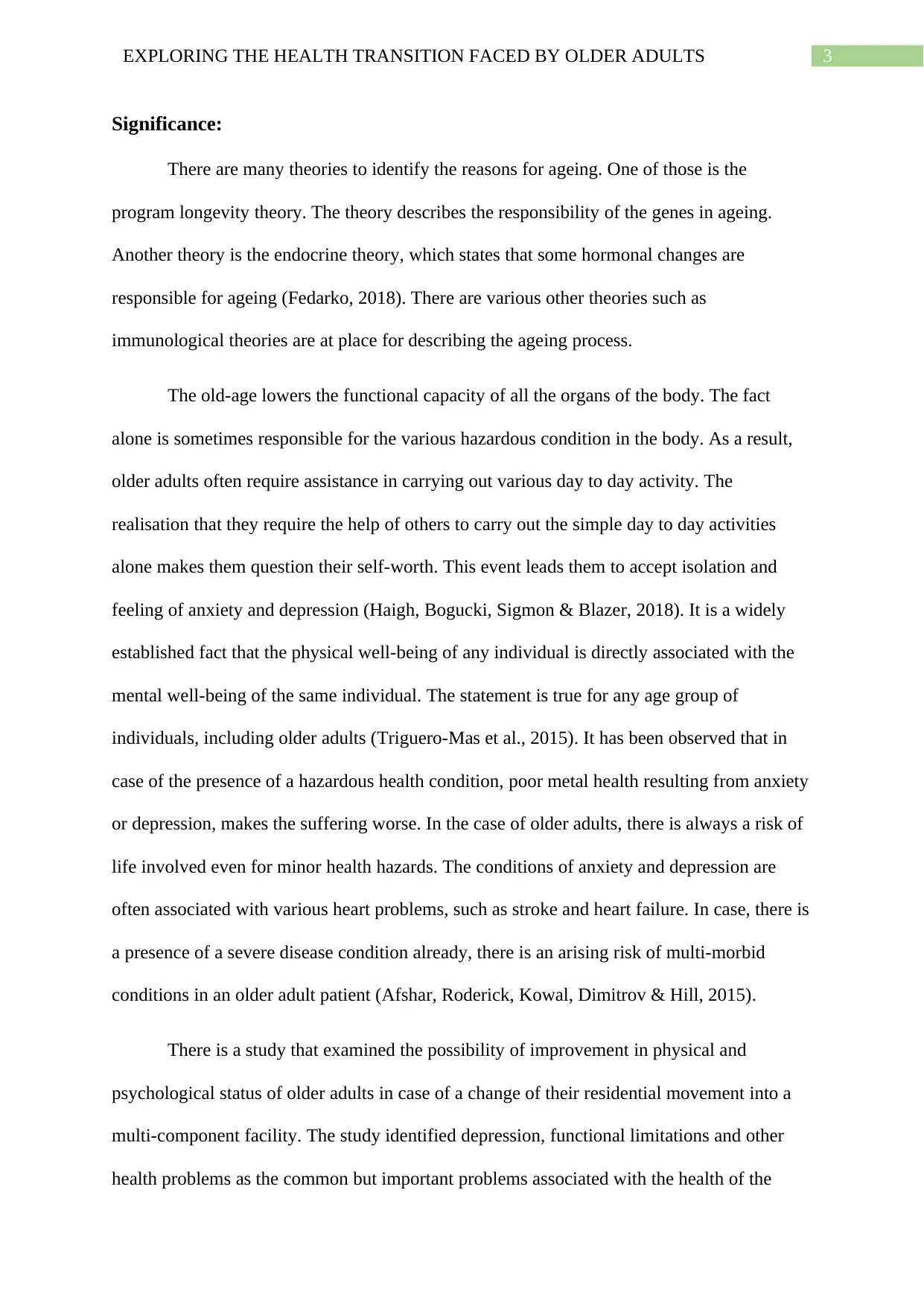
3EXPLORING THE HEALTH TRANSITION FACED BY OLDER ADULTS
Significance:
There are many theories to identify the reasons for ageing. One of those is the
program longevity theory. The theory describes the responsibility of the genes in ageing.
Another theory is the endocrine theory, which states that some hormonal changes are
responsible for ageing (Fedarko, 2018). There are various other theories such as
immunological theories are at place for describing the ageing process.
The old-age lowers the functional capacity of all the organs of the body. The fact
alone is sometimes responsible for the various hazardous condition in the body. As a result,
older adults often require assistance in carrying out various day to day activity. The
realisation that they require the help of others to carry out the simple day to day activities
alone makes them question their self-worth. This event leads them to accept isolation and
feeling of anxiety and depression (Haigh, Bogucki, Sigmon & Blazer, 2018). It is a widely
established fact that the physical well-being of any individual is directly associated with the
mental well-being of the same individual. The statement is true for any age group of
individuals, including older adults (Triguero-Mas et al., 2015). It has been observed that in
case of the presence of a hazardous health condition, poor metal health resulting from anxiety
or depression, makes the suffering worse. In the case of older adults, there is always a risk of
life involved even for minor health hazards. The conditions of anxiety and depression are
often associated with various heart problems, such as stroke and heart failure. In case, there is
a presence of a severe disease condition already, there is an arising risk of multi-morbid
conditions in an older adult patient (Afshar, Roderick, Kowal, Dimitrov & Hill, 2015).
There is a study that examined the possibility of improvement in physical and
psychological status of older adults in case of a change of their residential movement into a
multi-component facility. The study identified depression, functional limitations and other
health problems as the common but important problems associated with the health of the
Significance:
There are many theories to identify the reasons for ageing. One of those is the
program longevity theory. The theory describes the responsibility of the genes in ageing.
Another theory is the endocrine theory, which states that some hormonal changes are
responsible for ageing (Fedarko, 2018). There are various other theories such as
immunological theories are at place for describing the ageing process.
The old-age lowers the functional capacity of all the organs of the body. The fact
alone is sometimes responsible for the various hazardous condition in the body. As a result,
older adults often require assistance in carrying out various day to day activity. The
realisation that they require the help of others to carry out the simple day to day activities
alone makes them question their self-worth. This event leads them to accept isolation and
feeling of anxiety and depression (Haigh, Bogucki, Sigmon & Blazer, 2018). It is a widely
established fact that the physical well-being of any individual is directly associated with the
mental well-being of the same individual. The statement is true for any age group of
individuals, including older adults (Triguero-Mas et al., 2015). It has been observed that in
case of the presence of a hazardous health condition, poor metal health resulting from anxiety
or depression, makes the suffering worse. In the case of older adults, there is always a risk of
life involved even for minor health hazards. The conditions of anxiety and depression are
often associated with various heart problems, such as stroke and heart failure. In case, there is
a presence of a severe disease condition already, there is an arising risk of multi-morbid
conditions in an older adult patient (Afshar, Roderick, Kowal, Dimitrov & Hill, 2015).
There is a study that examined the possibility of improvement in physical and
psychological status of older adults in case of a change of their residential movement into a
multi-component facility. The study identified depression, functional limitations and other
health problems as the common but important problems associated with the health of the
Paraphrase This Document
Need a fresh take? Get an instant paraphrase of this document with our AI Paraphraser
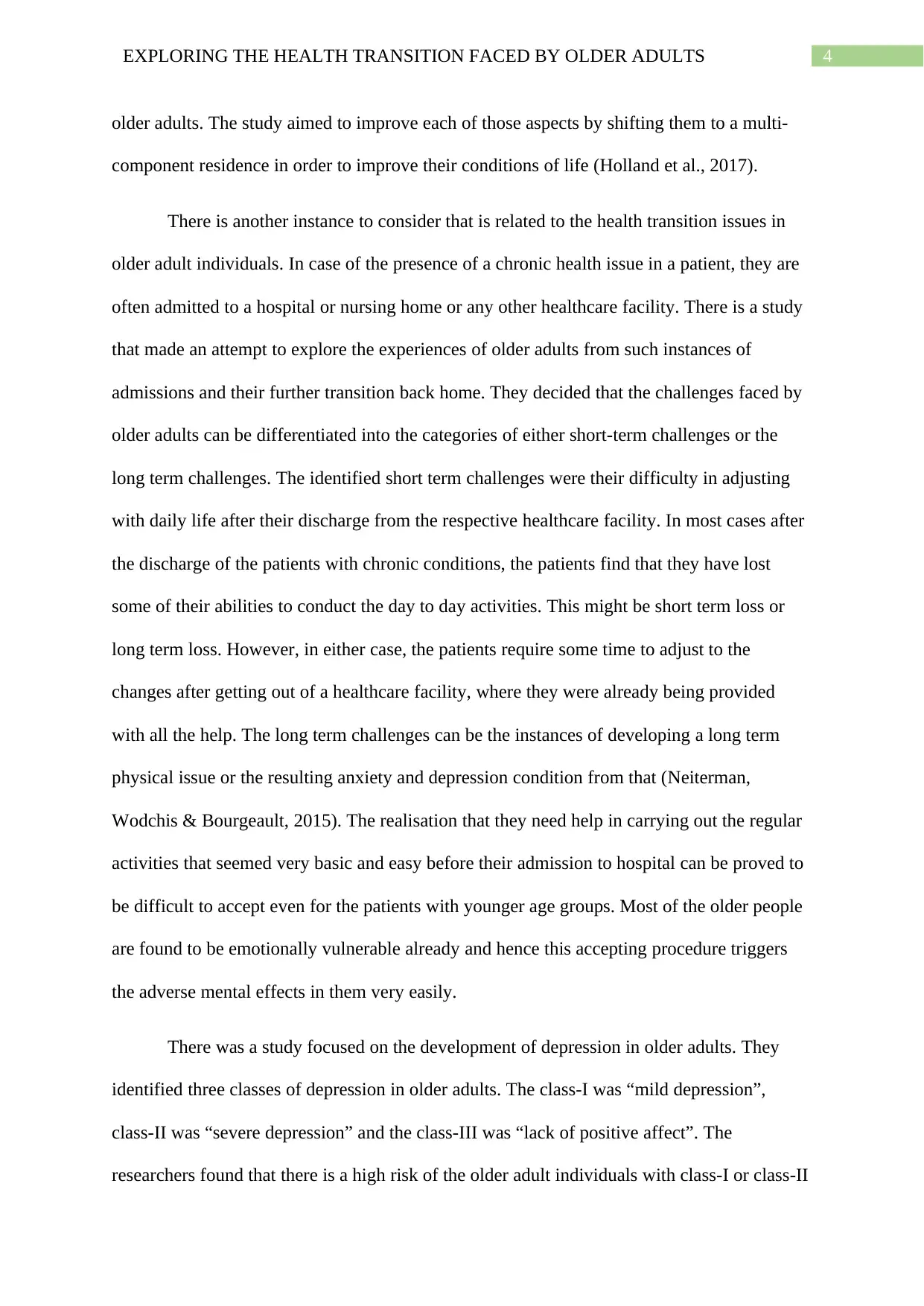
4EXPLORING THE HEALTH TRANSITION FACED BY OLDER ADULTS
older adults. The study aimed to improve each of those aspects by shifting them to a multi-
component residence in order to improve their conditions of life (Holland et al., 2017).
There is another instance to consider that is related to the health transition issues in
older adult individuals. In case of the presence of a chronic health issue in a patient, they are
often admitted to a hospital or nursing home or any other healthcare facility. There is a study
that made an attempt to explore the experiences of older adults from such instances of
admissions and their further transition back home. They decided that the challenges faced by
older adults can be differentiated into the categories of either short-term challenges or the
long term challenges. The identified short term challenges were their difficulty in adjusting
with daily life after their discharge from the respective healthcare facility. In most cases after
the discharge of the patients with chronic conditions, the patients find that they have lost
some of their abilities to conduct the day to day activities. This might be short term loss or
long term loss. However, in either case, the patients require some time to adjust to the
changes after getting out of a healthcare facility, where they were already being provided
with all the help. The long term challenges can be the instances of developing a long term
physical issue or the resulting anxiety and depression condition from that (Neiterman,
Wodchis & Bourgeault, 2015). The realisation that they need help in carrying out the regular
activities that seemed very basic and easy before their admission to hospital can be proved to
be difficult to accept even for the patients with younger age groups. Most of the older people
are found to be emotionally vulnerable already and hence this accepting procedure triggers
the adverse mental effects in them very easily.
There was a study focused on the development of depression in older adults. They
identified three classes of depression in older adults. The class-I was “mild depression”,
class-II was “severe depression” and the class-III was “lack of positive affect”. The
researchers found that there is a high risk of the older adult individuals with class-I or class-II
older adults. The study aimed to improve each of those aspects by shifting them to a multi-
component residence in order to improve their conditions of life (Holland et al., 2017).
There is another instance to consider that is related to the health transition issues in
older adult individuals. In case of the presence of a chronic health issue in a patient, they are
often admitted to a hospital or nursing home or any other healthcare facility. There is a study
that made an attempt to explore the experiences of older adults from such instances of
admissions and their further transition back home. They decided that the challenges faced by
older adults can be differentiated into the categories of either short-term challenges or the
long term challenges. The identified short term challenges were their difficulty in adjusting
with daily life after their discharge from the respective healthcare facility. In most cases after
the discharge of the patients with chronic conditions, the patients find that they have lost
some of their abilities to conduct the day to day activities. This might be short term loss or
long term loss. However, in either case, the patients require some time to adjust to the
changes after getting out of a healthcare facility, where they were already being provided
with all the help. The long term challenges can be the instances of developing a long term
physical issue or the resulting anxiety and depression condition from that (Neiterman,
Wodchis & Bourgeault, 2015). The realisation that they need help in carrying out the regular
activities that seemed very basic and easy before their admission to hospital can be proved to
be difficult to accept even for the patients with younger age groups. Most of the older people
are found to be emotionally vulnerable already and hence this accepting procedure triggers
the adverse mental effects in them very easily.
There was a study focused on the development of depression in older adults. They
identified three classes of depression in older adults. The class-I was “mild depression”,
class-II was “severe depression” and the class-III was “lack of positive affect”. The
researchers found that there is a high risk of the older adult individuals with class-I or class-II
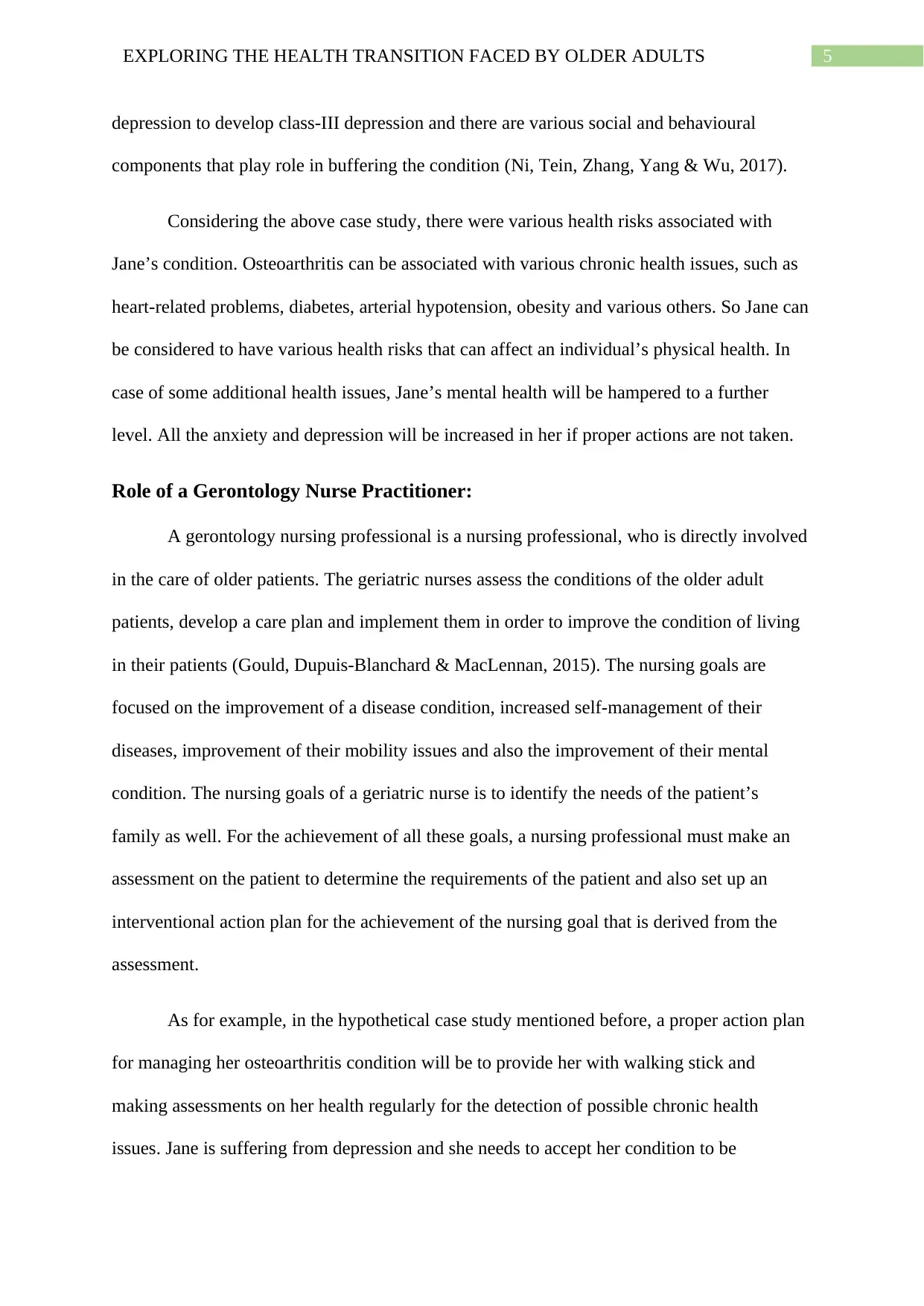
5EXPLORING THE HEALTH TRANSITION FACED BY OLDER ADULTS
depression to develop class-III depression and there are various social and behavioural
components that play role in buffering the condition (Ni, Tein, Zhang, Yang & Wu, 2017).
Considering the above case study, there were various health risks associated with
Jane’s condition. Osteoarthritis can be associated with various chronic health issues, such as
heart-related problems, diabetes, arterial hypotension, obesity and various others. So Jane can
be considered to have various health risks that can affect an individual’s physical health. In
case of some additional health issues, Jane’s mental health will be hampered to a further
level. All the anxiety and depression will be increased in her if proper actions are not taken.
Role of a Gerontology Nurse Practitioner:
A gerontology nursing professional is a nursing professional, who is directly involved
in the care of older patients. The geriatric nurses assess the conditions of the older adult
patients, develop a care plan and implement them in order to improve the condition of living
in their patients (Gould, Dupuis-Blanchard & MacLennan, 2015). The nursing goals are
focused on the improvement of a disease condition, increased self-management of their
diseases, improvement of their mobility issues and also the improvement of their mental
condition. The nursing goals of a geriatric nurse is to identify the needs of the patient’s
family as well. For the achievement of all these goals, a nursing professional must make an
assessment on the patient to determine the requirements of the patient and also set up an
interventional action plan for the achievement of the nursing goal that is derived from the
assessment.
As for example, in the hypothetical case study mentioned before, a proper action plan
for managing her osteoarthritis condition will be to provide her with walking stick and
making assessments on her health regularly for the detection of possible chronic health
issues. Jane is suffering from depression and she needs to accept her condition to be
depression to develop class-III depression and there are various social and behavioural
components that play role in buffering the condition (Ni, Tein, Zhang, Yang & Wu, 2017).
Considering the above case study, there were various health risks associated with
Jane’s condition. Osteoarthritis can be associated with various chronic health issues, such as
heart-related problems, diabetes, arterial hypotension, obesity and various others. So Jane can
be considered to have various health risks that can affect an individual’s physical health. In
case of some additional health issues, Jane’s mental health will be hampered to a further
level. All the anxiety and depression will be increased in her if proper actions are not taken.
Role of a Gerontology Nurse Practitioner:
A gerontology nursing professional is a nursing professional, who is directly involved
in the care of older patients. The geriatric nurses assess the conditions of the older adult
patients, develop a care plan and implement them in order to improve the condition of living
in their patients (Gould, Dupuis-Blanchard & MacLennan, 2015). The nursing goals are
focused on the improvement of a disease condition, increased self-management of their
diseases, improvement of their mobility issues and also the improvement of their mental
condition. The nursing goals of a geriatric nurse is to identify the needs of the patient’s
family as well. For the achievement of all these goals, a nursing professional must make an
assessment on the patient to determine the requirements of the patient and also set up an
interventional action plan for the achievement of the nursing goal that is derived from the
assessment.
As for example, in the hypothetical case study mentioned before, a proper action plan
for managing her osteoarthritis condition will be to provide her with walking stick and
making assessments on her health regularly for the detection of possible chronic health
issues. Jane is suffering from depression and she needs to accept her condition to be
⊘ This is a preview!⊘
Do you want full access?
Subscribe today to unlock all pages.

Trusted by 1+ million students worldwide
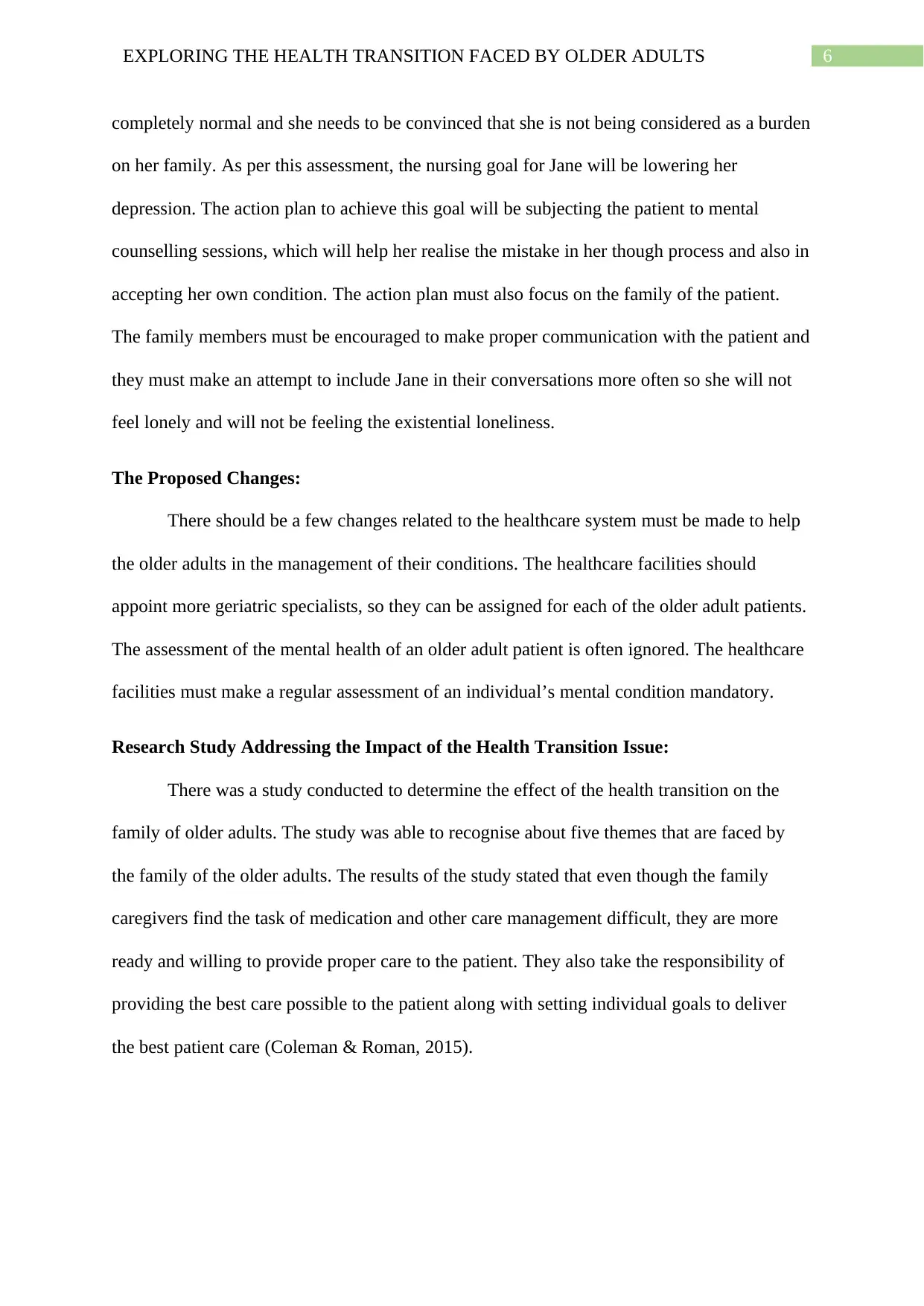
6EXPLORING THE HEALTH TRANSITION FACED BY OLDER ADULTS
completely normal and she needs to be convinced that she is not being considered as a burden
on her family. As per this assessment, the nursing goal for Jane will be lowering her
depression. The action plan to achieve this goal will be subjecting the patient to mental
counselling sessions, which will help her realise the mistake in her though process and also in
accepting her own condition. The action plan must also focus on the family of the patient.
The family members must be encouraged to make proper communication with the patient and
they must make an attempt to include Jane in their conversations more often so she will not
feel lonely and will not be feeling the existential loneliness.
The Proposed Changes:
There should be a few changes related to the healthcare system must be made to help
the older adults in the management of their conditions. The healthcare facilities should
appoint more geriatric specialists, so they can be assigned for each of the older adult patients.
The assessment of the mental health of an older adult patient is often ignored. The healthcare
facilities must make a regular assessment of an individual’s mental condition mandatory.
Research Study Addressing the Impact of the Health Transition Issue:
There was a study conducted to determine the effect of the health transition on the
family of older adults. The study was able to recognise about five themes that are faced by
the family of the older adults. The results of the study stated that even though the family
caregivers find the task of medication and other care management difficult, they are more
ready and willing to provide proper care to the patient. They also take the responsibility of
providing the best care possible to the patient along with setting individual goals to deliver
the best patient care (Coleman & Roman, 2015).
completely normal and she needs to be convinced that she is not being considered as a burden
on her family. As per this assessment, the nursing goal for Jane will be lowering her
depression. The action plan to achieve this goal will be subjecting the patient to mental
counselling sessions, which will help her realise the mistake in her though process and also in
accepting her own condition. The action plan must also focus on the family of the patient.
The family members must be encouraged to make proper communication with the patient and
they must make an attempt to include Jane in their conversations more often so she will not
feel lonely and will not be feeling the existential loneliness.
The Proposed Changes:
There should be a few changes related to the healthcare system must be made to help
the older adults in the management of their conditions. The healthcare facilities should
appoint more geriatric specialists, so they can be assigned for each of the older adult patients.
The assessment of the mental health of an older adult patient is often ignored. The healthcare
facilities must make a regular assessment of an individual’s mental condition mandatory.
Research Study Addressing the Impact of the Health Transition Issue:
There was a study conducted to determine the effect of the health transition on the
family of older adults. The study was able to recognise about five themes that are faced by
the family of the older adults. The results of the study stated that even though the family
caregivers find the task of medication and other care management difficult, they are more
ready and willing to provide proper care to the patient. They also take the responsibility of
providing the best care possible to the patient along with setting individual goals to deliver
the best patient care (Coleman & Roman, 2015).
Paraphrase This Document
Need a fresh take? Get an instant paraphrase of this document with our AI Paraphraser
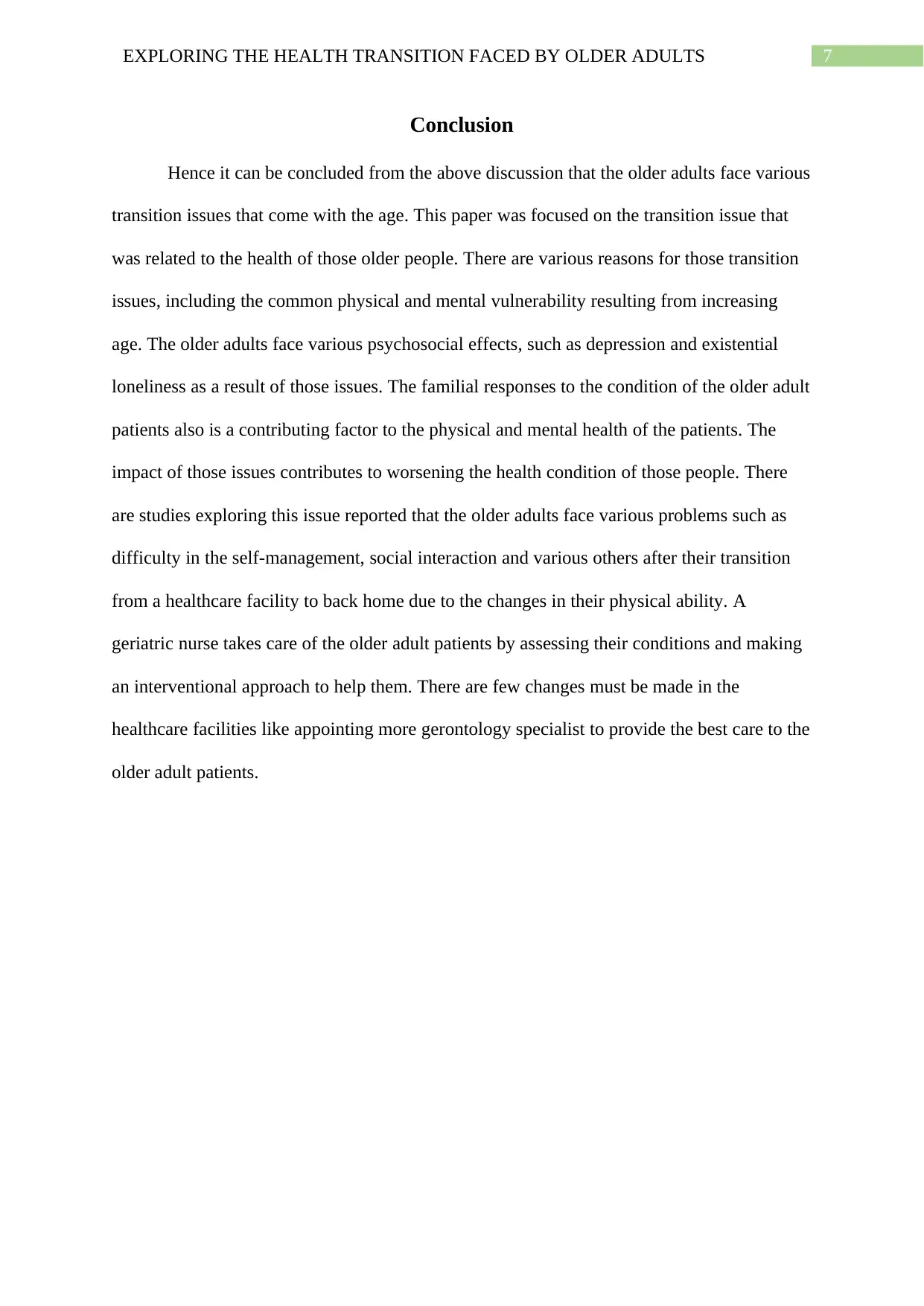
7EXPLORING THE HEALTH TRANSITION FACED BY OLDER ADULTS
Conclusion
Hence it can be concluded from the above discussion that the older adults face various
transition issues that come with the age. This paper was focused on the transition issue that
was related to the health of those older people. There are various reasons for those transition
issues, including the common physical and mental vulnerability resulting from increasing
age. The older adults face various psychosocial effects, such as depression and existential
loneliness as a result of those issues. The familial responses to the condition of the older adult
patients also is a contributing factor to the physical and mental health of the patients. The
impact of those issues contributes to worsening the health condition of those people. There
are studies exploring this issue reported that the older adults face various problems such as
difficulty in the self-management, social interaction and various others after their transition
from a healthcare facility to back home due to the changes in their physical ability. A
geriatric nurse takes care of the older adult patients by assessing their conditions and making
an interventional approach to help them. There are few changes must be made in the
healthcare facilities like appointing more gerontology specialist to provide the best care to the
older adult patients.
Conclusion
Hence it can be concluded from the above discussion that the older adults face various
transition issues that come with the age. This paper was focused on the transition issue that
was related to the health of those older people. There are various reasons for those transition
issues, including the common physical and mental vulnerability resulting from increasing
age. The older adults face various psychosocial effects, such as depression and existential
loneliness as a result of those issues. The familial responses to the condition of the older adult
patients also is a contributing factor to the physical and mental health of the patients. The
impact of those issues contributes to worsening the health condition of those people. There
are studies exploring this issue reported that the older adults face various problems such as
difficulty in the self-management, social interaction and various others after their transition
from a healthcare facility to back home due to the changes in their physical ability. A
geriatric nurse takes care of the older adult patients by assessing their conditions and making
an interventional approach to help them. There are few changes must be made in the
healthcare facilities like appointing more gerontology specialist to provide the best care to the
older adult patients.
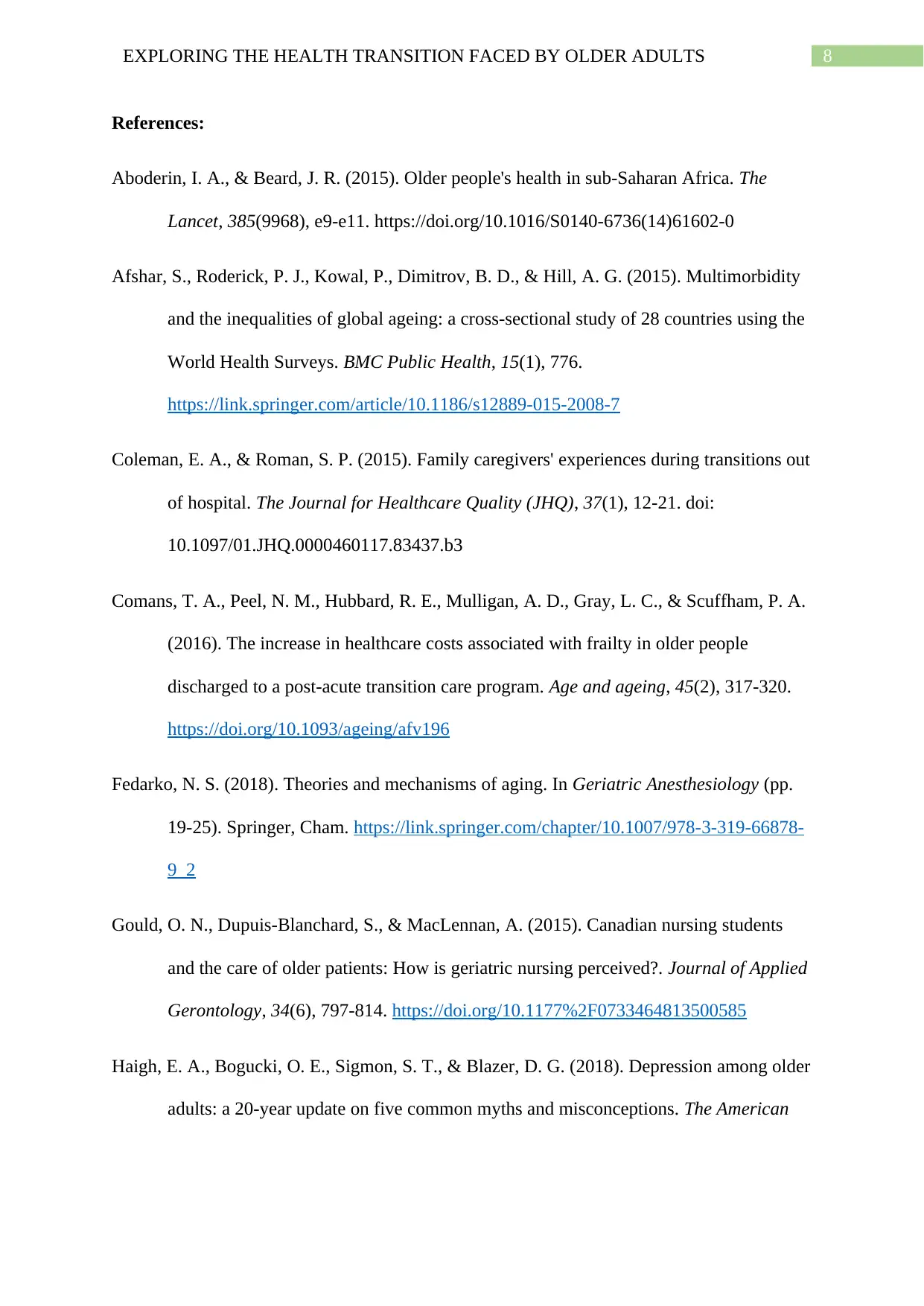
8EXPLORING THE HEALTH TRANSITION FACED BY OLDER ADULTS
References:
Aboderin, I. A., & Beard, J. R. (2015). Older people's health in sub-Saharan Africa. The
Lancet, 385(9968), e9-e11. https://doi.org/10.1016/S0140-6736(14)61602-0
Afshar, S., Roderick, P. J., Kowal, P., Dimitrov, B. D., & Hill, A. G. (2015). Multimorbidity
and the inequalities of global ageing: a cross-sectional study of 28 countries using the
World Health Surveys. BMC Public Health, 15(1), 776.
https://link.springer.com/article/10.1186/s12889-015-2008-7
Coleman, E. A., & Roman, S. P. (2015). Family caregivers' experiences during transitions out
of hospital. The Journal for Healthcare Quality (JHQ), 37(1), 12-21. doi:
10.1097/01.JHQ.0000460117.83437.b3
Comans, T. A., Peel, N. M., Hubbard, R. E., Mulligan, A. D., Gray, L. C., & Scuffham, P. A.
(2016). The increase in healthcare costs associated with frailty in older people
discharged to a post-acute transition care program. Age and ageing, 45(2), 317-320.
https://doi.org/10.1093/ageing/afv196
Fedarko, N. S. (2018). Theories and mechanisms of aging. In Geriatric Anesthesiology (pp.
19-25). Springer, Cham. https://link.springer.com/chapter/10.1007/978-3-319-66878-
9_2
Gould, O. N., Dupuis-Blanchard, S., & MacLennan, A. (2015). Canadian nursing students
and the care of older patients: How is geriatric nursing perceived?. Journal of Applied
Gerontology, 34(6), 797-814. https://doi.org/10.1177%2F0733464813500585
Haigh, E. A., Bogucki, O. E., Sigmon, S. T., & Blazer, D. G. (2018). Depression among older
adults: a 20-year update on five common myths and misconceptions. The American
References:
Aboderin, I. A., & Beard, J. R. (2015). Older people's health in sub-Saharan Africa. The
Lancet, 385(9968), e9-e11. https://doi.org/10.1016/S0140-6736(14)61602-0
Afshar, S., Roderick, P. J., Kowal, P., Dimitrov, B. D., & Hill, A. G. (2015). Multimorbidity
and the inequalities of global ageing: a cross-sectional study of 28 countries using the
World Health Surveys. BMC Public Health, 15(1), 776.
https://link.springer.com/article/10.1186/s12889-015-2008-7
Coleman, E. A., & Roman, S. P. (2015). Family caregivers' experiences during transitions out
of hospital. The Journal for Healthcare Quality (JHQ), 37(1), 12-21. doi:
10.1097/01.JHQ.0000460117.83437.b3
Comans, T. A., Peel, N. M., Hubbard, R. E., Mulligan, A. D., Gray, L. C., & Scuffham, P. A.
(2016). The increase in healthcare costs associated with frailty in older people
discharged to a post-acute transition care program. Age and ageing, 45(2), 317-320.
https://doi.org/10.1093/ageing/afv196
Fedarko, N. S. (2018). Theories and mechanisms of aging. In Geriatric Anesthesiology (pp.
19-25). Springer, Cham. https://link.springer.com/chapter/10.1007/978-3-319-66878-
9_2
Gould, O. N., Dupuis-Blanchard, S., & MacLennan, A. (2015). Canadian nursing students
and the care of older patients: How is geriatric nursing perceived?. Journal of Applied
Gerontology, 34(6), 797-814. https://doi.org/10.1177%2F0733464813500585
Haigh, E. A., Bogucki, O. E., Sigmon, S. T., & Blazer, D. G. (2018). Depression among older
adults: a 20-year update on five common myths and misconceptions. The American
⊘ This is a preview!⊘
Do you want full access?
Subscribe today to unlock all pages.

Trusted by 1+ million students worldwide
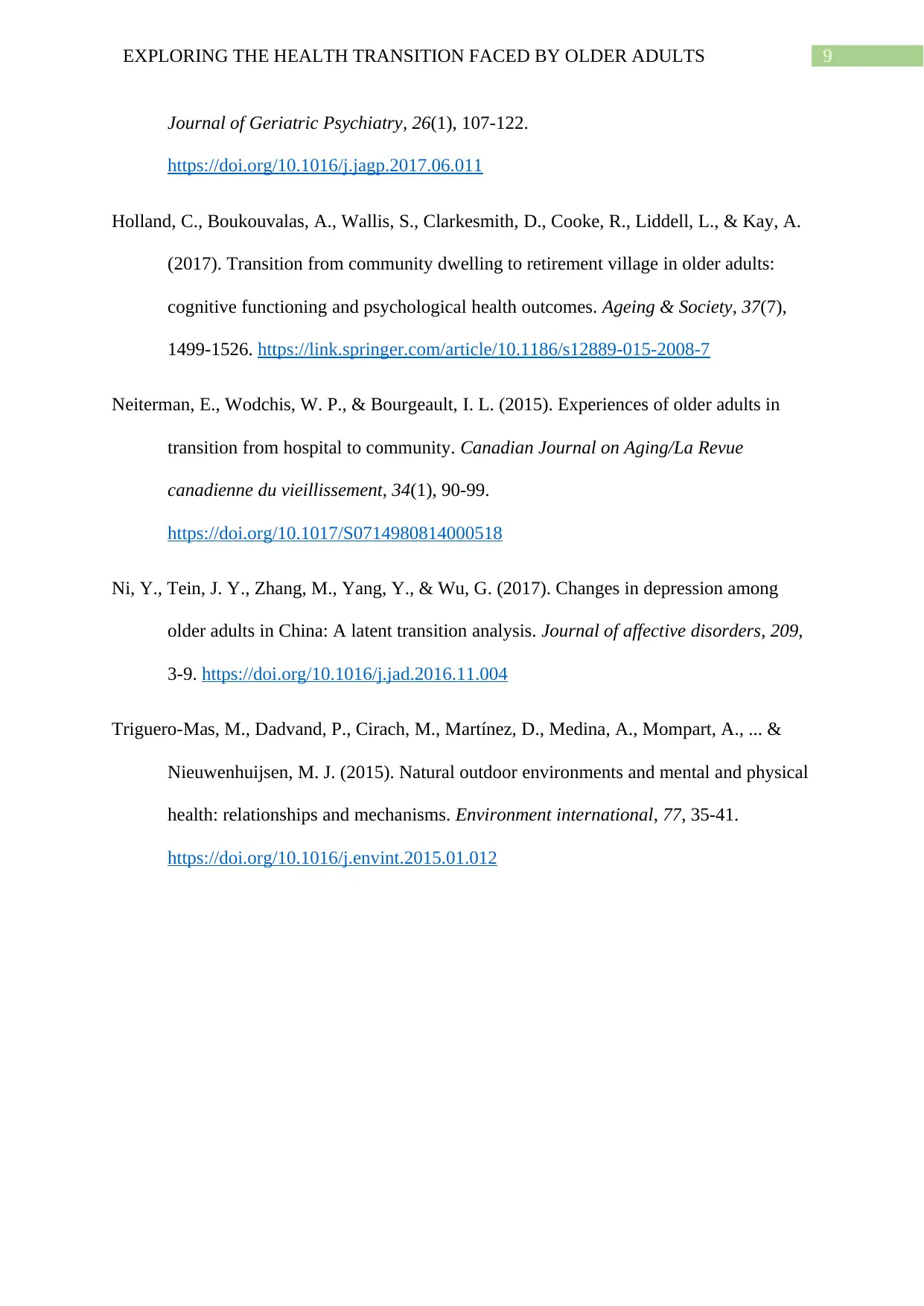
9EXPLORING THE HEALTH TRANSITION FACED BY OLDER ADULTS
Journal of Geriatric Psychiatry, 26(1), 107-122.
https://doi.org/10.1016/j.jagp.2017.06.011
Holland, C., Boukouvalas, A., Wallis, S., Clarkesmith, D., Cooke, R., Liddell, L., & Kay, A.
(2017). Transition from community dwelling to retirement village in older adults:
cognitive functioning and psychological health outcomes. Ageing & Society, 37(7),
1499-1526. https://link.springer.com/article/10.1186/s12889-015-2008-7
Neiterman, E., Wodchis, W. P., & Bourgeault, I. L. (2015). Experiences of older adults in
transition from hospital to community. Canadian Journal on Aging/La Revue
canadienne du vieillissement, 34(1), 90-99.
https://doi.org/10.1017/S0714980814000518
Ni, Y., Tein, J. Y., Zhang, M., Yang, Y., & Wu, G. (2017). Changes in depression among
older adults in China: A latent transition analysis. Journal of affective disorders, 209,
3-9. https://doi.org/10.1016/j.jad.2016.11.004
Triguero-Mas, M., Dadvand, P., Cirach, M., Martínez, D., Medina, A., Mompart, A., ... &
Nieuwenhuijsen, M. J. (2015). Natural outdoor environments and mental and physical
health: relationships and mechanisms. Environment international, 77, 35-41.
https://doi.org/10.1016/j.envint.2015.01.012
Journal of Geriatric Psychiatry, 26(1), 107-122.
https://doi.org/10.1016/j.jagp.2017.06.011
Holland, C., Boukouvalas, A., Wallis, S., Clarkesmith, D., Cooke, R., Liddell, L., & Kay, A.
(2017). Transition from community dwelling to retirement village in older adults:
cognitive functioning and psychological health outcomes. Ageing & Society, 37(7),
1499-1526. https://link.springer.com/article/10.1186/s12889-015-2008-7
Neiterman, E., Wodchis, W. P., & Bourgeault, I. L. (2015). Experiences of older adults in
transition from hospital to community. Canadian Journal on Aging/La Revue
canadienne du vieillissement, 34(1), 90-99.
https://doi.org/10.1017/S0714980814000518
Ni, Y., Tein, J. Y., Zhang, M., Yang, Y., & Wu, G. (2017). Changes in depression among
older adults in China: A latent transition analysis. Journal of affective disorders, 209,
3-9. https://doi.org/10.1016/j.jad.2016.11.004
Triguero-Mas, M., Dadvand, P., Cirach, M., Martínez, D., Medina, A., Mompart, A., ... &
Nieuwenhuijsen, M. J. (2015). Natural outdoor environments and mental and physical
health: relationships and mechanisms. Environment international, 77, 35-41.
https://doi.org/10.1016/j.envint.2015.01.012
1 out of 10
Related Documents
Your All-in-One AI-Powered Toolkit for Academic Success.
+13062052269
info@desklib.com
Available 24*7 on WhatsApp / Email
![[object Object]](/_next/static/media/star-bottom.7253800d.svg)
Unlock your academic potential
Copyright © 2020–2026 A2Z Services. All Rights Reserved. Developed and managed by ZUCOL.





